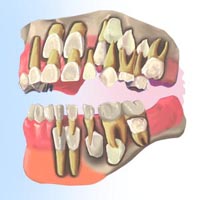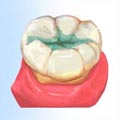Baby to Permanent Teeth
 As your child nears age 6, the jaws grow, making room for the permanent teeth. At the same time, the roots of the primary teeth begin to be absorbed by the tissue around them, and the permanent teeth under them prepare to erupt. As your child nears age 6, the jaws grow, making room for the permanent teeth. At the same time, the roots of the primary teeth begin to be absorbed by the tissue around them, and the permanent teeth under them prepare to erupt.
The first permanent molars usually erupt between ages five and six, so they are sometimes called the six-year molars. Because the six-year molars do not replace any primary teeth they are often mistaken for primary teeth. You should remember that they are permanent teeth and must be cared for properly if they are to last throughout your child's lifetime. These molars are especially important because they determine the shape of the lower part of the face. They also affect the position and health of the other permanent teeth.
Sometimes a primary tooth is lost before a permanent tooth beneath it is ready to erupt. If primary teeth are lost too early, nearby teeth can tip or move into the vacant space. When the permanent teeth are ready to come into the mouth, there will not be enough room. As a result, they may erupt out of their proper position, leading to malocclusion.
To avoid such future problems, your dentist may recommend using a space maintainer to reserve space for the permanent tooth. If a primary tooth does not fall out when it should, your dentist may recommend that it be removed to prevent the irregular eruption of the permanent tooth.
Your dentist may recommend that your child use an over-the-counter fluoride mouthrinse daily after age six. Be sure to instruct and, if necessary, supervise your child in the use of these mouthrinses. By age 7, your child should be able to brush alone. Flossing, however, is a more difficult skill to master. At about age 8, the child should be able to floss his or her own teeth under your supervision.
(Back to top)
|
